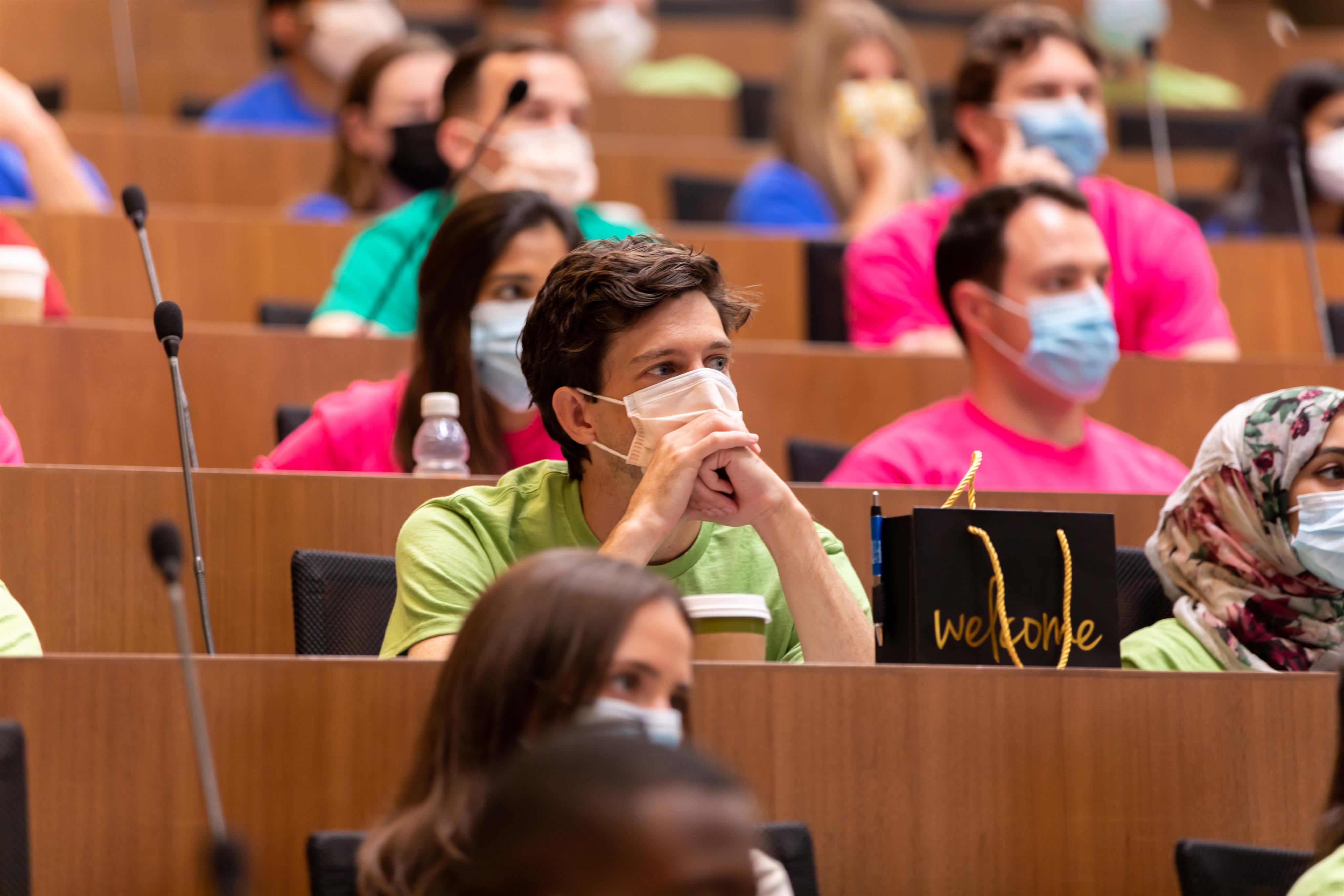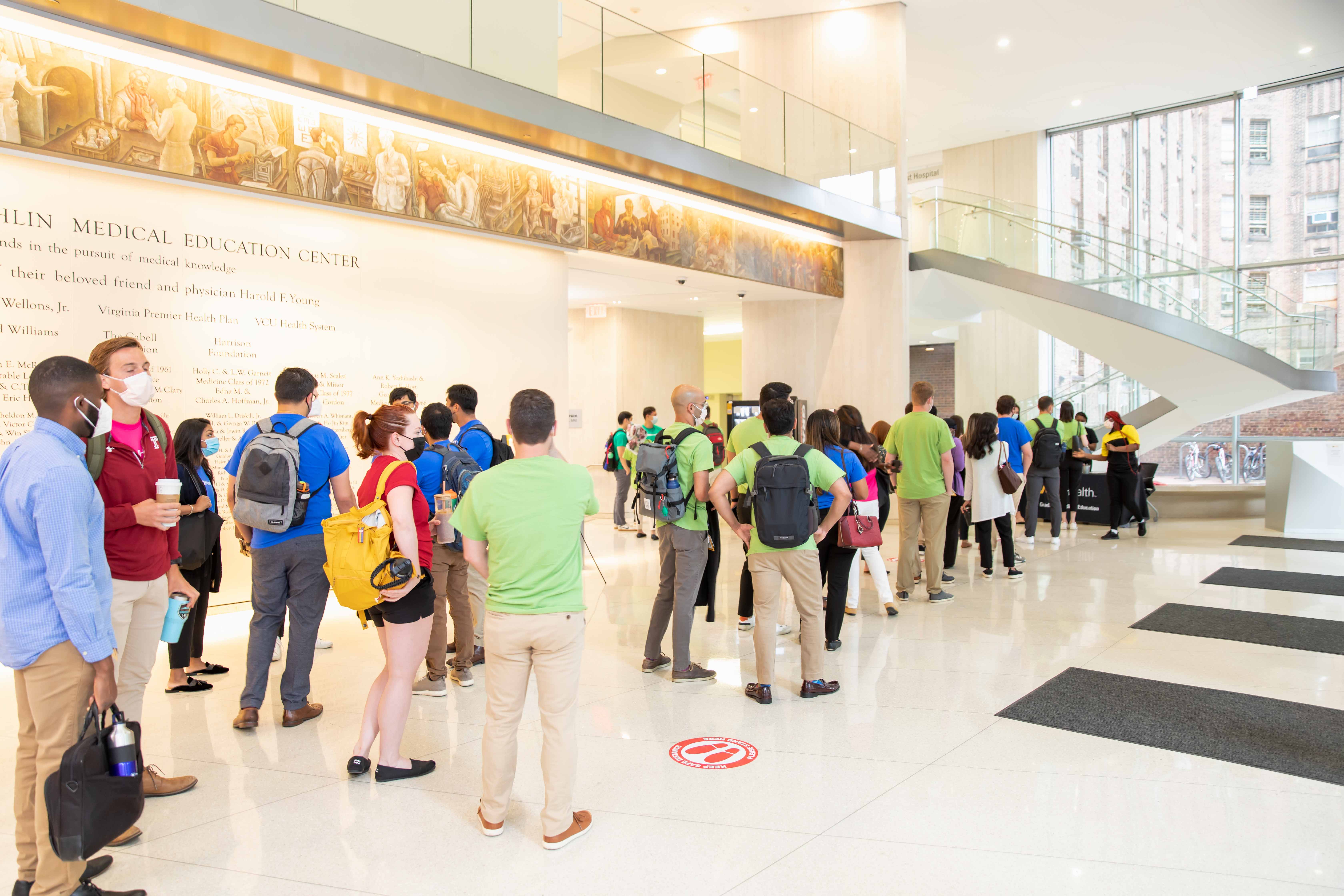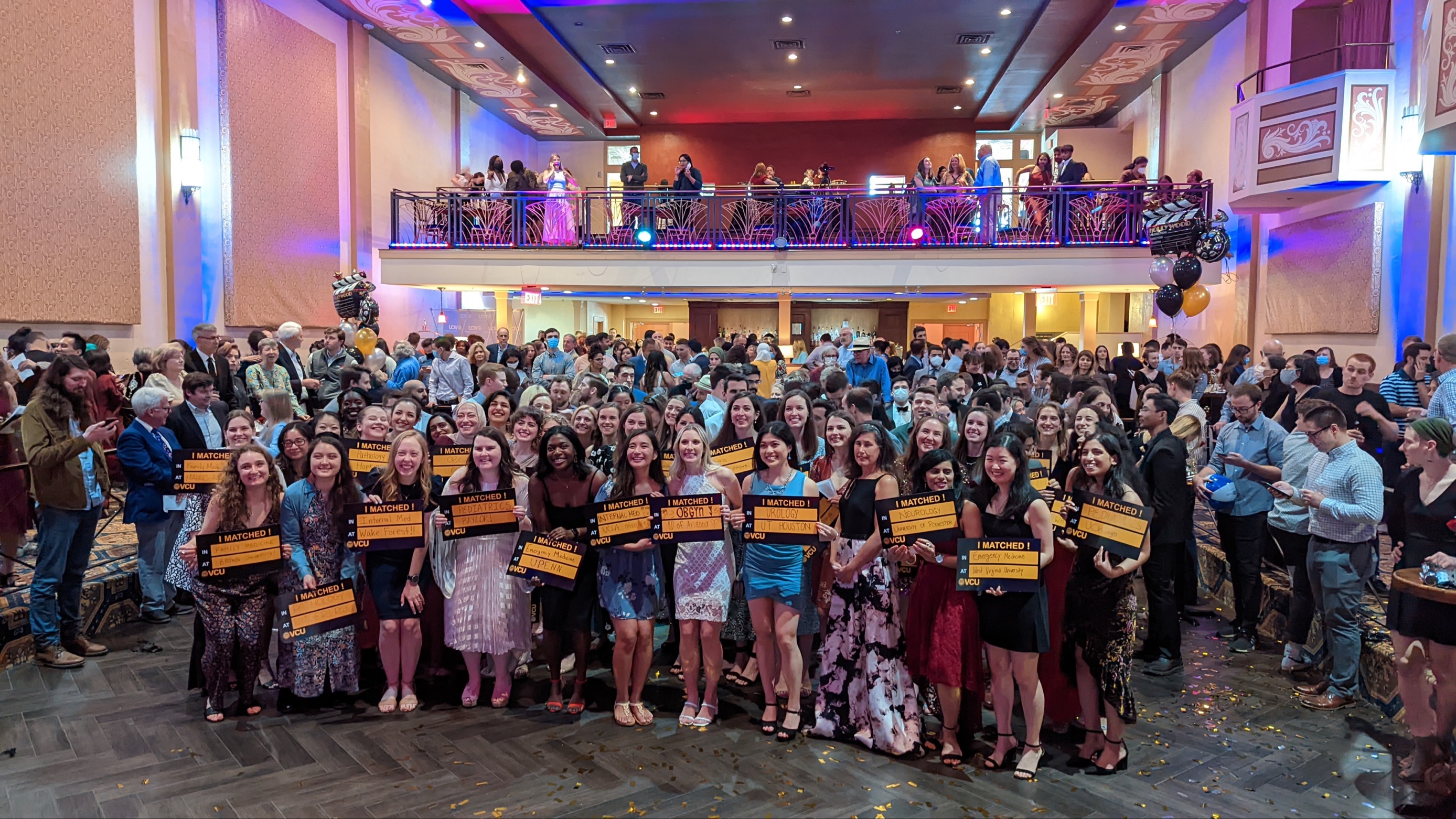‘A numbers game’
With more applicants vying for limited spots each year, medical students and program directors face growing challenges in the Residency Match.

This year's new residents and fellows attended Walk the Walk orientation before beginning their first rotations on July 1. (Photo by DeAudrea 'Sha' Rich)
This week, 237 new interns, residents and fellows join the VCU School of Medicine and VCU Health to train in their chosen specialties. They are among 39,054 trainees who accepted positions through the 2022 Main Residency Match, which was the largest in the National Residency Match Program’s 70-year history. As the Match grows increasingly competitive, with the number of applicants exceeding the number of available positions by about 20%, program directors, administrators and graduating medical students face difficult questions.
Overapplication
Research shows that the rise in residency applications began in the 1990s and was exacerbated by the COVID-19 pandemic. Medical students today apply to nearly double the number of residency programs as they did 10 years ago, according to a 2021 paper exploring the causes and impacts of what the authors call “overapplication.” In 2020, the average U.S. medical school graduate applied to 70 programs.
Nicole Karjane, M.D., a professor in the Department of Obstetrics and Gynecology, applied to 20 programs when she was a medical student in the 1990s — she then went on to complete her residency at VCU in 2004. This year, her 10th as VCU’s OB-GYN residency program director, she sifted through upwards of 900 applications from students seeking to fill six available positions.
“It makes it impossible for me to know who of these great applicants is interested in our program,” Karjane said. “I understand why they do it. They want a spot. But unfortunately, by indiscriminately applying to a bunch of programs, they are making it harder for themselves.”
One of those applicants was Ayesha Yakubu, M.D., who graduated from the University of North Carolina School of Medicine this year and matched into OB-GYN at VCU. Yakubu applied to dozens of programs. She said that she had "mixed feelings" about how many applications to send out but ultimately decided that applying broadly was her only option.
“I hate to say this, but it’s a numbers game,” Yakubu said, noting that some of her classmates who applied to 30 or 40 programs struggled to get interviews. “At the end of the day, you don’t know how this process will work out. I wanted to play it safe and give myself the best opportunity to succeed.”
Yakubu understands the burden that overapplication puts on program directors and said the responsibility should not be on students to curb the issue. She hopes to see more initiatives from the governing bodies of medical specialties, such as a designated cap on the number of applications each student can submit.
“If I decide, out of my own good will, that I’m going to apply to only 60 programs, but others are applying to 80, I’m putting myself at a disadvantage,” she said. “The only people who can regulate this are the folks who are leading the charge with residency applications.”
Many leaders within medical specialties share Yakubu’s concerns and have begun piloting initiatives to improve the recruitment process through new application standards and metrics. For example, three years ago the Association of Professors of Gynecology and Obstetrics launched Right Resident, Right Program, Ready Day One, or RRR, an initiative funded by a Reimagining Residency grant from the American Medical Association.
VCU’s is one of nearly 250 OB-GYN residency programs nationwide participating in RRR, which recently released new recommended standards for the 2022–2023 academic year. Recommendations include releasing interview offers on the same day, which allows students to determine how competitive they are and accept or decline based on their interest in specific programs; limiting invitations to the number of interview slots available; and allowing a minimum of 48 hours for students to accept or decline interview offers.
Karjane said leaders in OB-GYN also have borrowed ideas from other specialties, such as a signaling system. Starting this year, each OB-GYN applicant will have three gold and 15 silver signals, which they can use to indicate their sincere interest in specific programs. Signaling is voluntary, and both applicants and programs must opt in to participate.
“That way they can signal to programs that they are not just one of 80,” Karjane said. “That’s going to help us as program directors make better decisions about who to interview.” She hopes that over time, the signaling system will de-incentivize overapplying.
Prioritizing equity
Program directors report that although the influx of applications can be overwhelming, since interviews went virtual due to COVID restrictions in 2020, they have met more qualified students who may not have otherwise applied. This pivot to virtual interviews opened new doors for students who lacked the resources to travel for in-person interviews, allowing them to apply more broadly. But as COVID restrictions eased ahead of the 2022 Match and some programs began resuming face-to-face interviews and campus tours, program directors and administrators faced tough questions about equity.
“If people are willing to spend the time and money, that shows motivation, but not everybody has the time and money,” said Brian Aboff, M.D., senior associate dean for graduate medical education. “I don’t think programs around the country have figured this out yet. In the future, I think we’ll have some type of hybrid model, but there are still details to be worked out.”
Joel Moll, M.D., who’s been the program director of VCU’s emergency medicine residency for seven years, agreed. He noted that personal connection can get lost via Zoom, and he wants to offer students the option of visiting, but he is determined to keep the playing field as level as possible. A few students from this year’s applicant pool traveled to Richmond for a second look at VCU, and Moll removed himself from the process to avoid injecting bias into his rank list.
“I don’t want people to feel like they have to visit in order to be a competitive applicant but know they can if they need that in order to make an informed decision,” Moll said.
Karjane said OB-GYN programs have taken a similar approach, and as buy-in of new standards has steadily increased among OB-GYN programs over the past three years, leaders across all specialties are learning from one another to continuously improve the recruitment process.
“We’re all realizing the status quo just isn’t working well,” Karjane said. “And now that we have adapted pretty successfully to the virtual model, I think it would be hard to go back the other way.”
This week, 237 new interns, residents and fellows join the VCU School of Medicine and VCU Health to train in their chosen specialties. They are among 39,054 trainees who accepted positions through the 2022 Main Residency Match, which was the largest in the National Residency Match Program’s 70-year history. As the Match grows increasingly competitive, with the number of applicants exceeding the number of available positions by about 20%, program directors, administrators and graduating medical students face difficult questions.
Overapplication
Research shows that the rise in residency applications began in the 1990s and was exacerbated by the COVID-19 pandemic. Medical students today apply to nearly double the number of residency programs as they did 10 years ago, according to a 2021 paper exploring the causes and impacts of what the authors call “overapplication.” In 2020, the average U.S. medical school graduate applied to 70 programs.
Nicole Karjane, M.D., a professor in the Department of Obstetrics and Gynecology, applied to 20 programs when she was a medical student in the 1990s — she then went on to complete her residency at VCU in 2004. This year, her 10th as VCU’s OB-GYN residency program director, she sifted through upwards of 900 applications from students seeking to fill six available positions.
“It makes it impossible for me to know who of these great applicants is interested in our program,” Karjane said. “I understand why they do it. They want a spot. But unfortunately, by indiscriminately applying to a bunch of programs, they are making it harder for themselves.”
One of those applicants was Ayesha Yakubu, M.D., who graduated from the University of North Carolina School of Medicine this year and matched into OB-GYN at VCU. Yakubu applied to dozens of programs. She said that she had "mixed feelings" about how many applications to send out but ultimately decided that applying broadly was her only option.
“I hate to say this, but it’s a numbers game,” Yakubu said, noting that some of her classmates who applied to 30 or 40 programs struggled to get interviews. “At the end of the day, you don’t know how this process will work out. I wanted to play it safe and give myself the best opportunity to succeed.”
Yakubu understands the burden that overapplication puts on program directors and said the responsibility should not be on students to curb the issue. She hopes to see more initiatives from the governing bodies of medical specialties, such as a designated cap on the number of applications each student can submit.
“If I decide, out of my own good will, that I’m going to apply to only 60 programs, but others are applying to 80, I’m putting myself at a disadvantage,” she said. “The only people who can regulate this are the folks who are leading the charge with residency applications.”
Many leaders within medical specialties share Yakubu’s concerns and have begun piloting initiatives to improve the recruitment process through new application standards and metrics. For example, three years ago the Association of Professors of Gynecology and Obstetrics launched Right Resident, Right Program, Ready Day One, or RRR, an initiative funded by a Reimagining Residency grant from the American Medical Association.
VCU’s is one of nearly 250 OB-GYN residency programs nationwide participating in RRR, which recently released new recommended standards for the 2022–2023 academic year. Recommendations include releasing interview offers on the same day, which allows students to determine how competitive they are and accept or decline based on their interest in specific programs; limiting invitations to the number of interview slots available; and allowing a minimum of 48 hours for students to accept or decline interview offers.
Karjane said leaders in OB-GYN also have borrowed ideas from other specialties, such as a signaling system. Starting this year, each OB-GYN applicant will have three gold and 15 silver signals, which they can use to indicate their sincere interest in specific programs. Signaling is voluntary, and both applicants and programs must opt in to participate.
“That way they can signal to programs that they are not just one of 80,” Karjane said. “That’s going to help us as program directors make better decisions about who to interview.” She hopes that over time, the signaling system will de-incentivize overapplying.
Prioritizing equity
Program directors report that although the influx of applications can be overwhelming, since interviews went virtual due to COVID restrictions in 2020, they have met more qualified students who may not have otherwise applied. This pivot to virtual interviews opened new doors for students who lacked the resources to travel for in-person interviews, allowing them to apply more broadly. But as COVID restrictions eased ahead of the 2022 Match and some programs began resuming face-to-face interviews and campus tours, program directors and administrators faced tough questions about equity.
“If people are willing to spend the time and money, that shows motivation, but not everybody has the time and money,” said Brian Aboff, M.D., senior associate dean for graduate medical education. “I don’t think programs around the country have figured this out yet. In the future, I think we’ll have some type of hybrid model, but there are still details to be worked out.”
Joel Moll, M.D., who’s been the program director of VCU’s emergency medicine residency for seven years, agreed. He noted that personal connection can get lost via Zoom, and he wants to offer students the option of visiting, but he is determined to keep the playing field as level as possible. A few students from this year’s applicant pool traveled to Richmond for a second look at VCU, and Moll removed himself from the process to avoid injecting bias into his rank list.
“I don’t want people to feel like they have to visit in order to be a competitive applicant but know they can if they need that in order to make an informed decision,” Moll said.
Karjane said OB-GYN programs have taken a similar approach, and as buy-in of new standards has steadily increased among OB-GYN programs over the past three years, leaders across all specialties are learning from one another to continuously improve the recruitment process.
“We’re all realizing the status quo just isn’t working well,” Karjane said. “And now that we have adapted pretty successfully to the virtual model, I think it would be hard to go back the other way.”
Looking ahead
This spring, the Association of American Medical Colleges released a set of guidelines for the 2022–2023 Match cycle, with the full support of the National Residency Matching Program. The guidance encourages programs to conduct virtual interviews for all applicants, including those who are local, citing “increased equity in the process due to substantial reduction in applicants’ travel costs.”
Tags:

